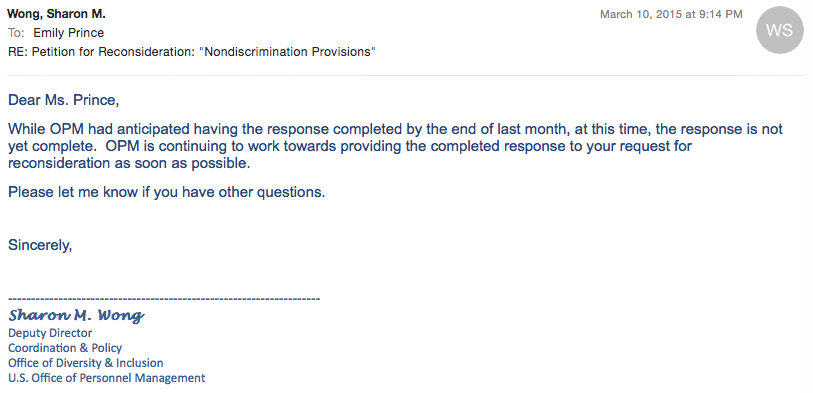Section 1557 of the Affordable Care Act, codified at 42 USC 18116, prohibits discrimination on the basis of race, color, national origin, sex, age, and disability in “any health program or activity, any part of which is receiving Federal financial assistance, including credits, subsidies, or contracts of insurance, or under any program or activity that is administered by an Executive Agency or any entity established under” the Affordable Care Act (ACA). This means covered health programs and activities should include Medicare, Medicaid, insurance for Federal employees (administered by the Office of Personnel Management), insurance through the exchanges (which are established under the ACA), and insurance through employers (which receive Federal tax subsidies through the exclusion of premiums from taxation; this is admittedly a stretch, but one I think is justified). Which is to say, largely the entire universe of health insurance. Even if employer-based health insurance is excluded, the set of covered programs is still quite broad.
The Department of Justice (after losing in litigation on the question, Macy v. Holder) has determined that discrimination on the basis of sex includes discrimination on the basis of gender identity, as was widely reported in December.
This raises the question: why is it still legal for covered programs to discriminate on the basis of gender identity by excluding coverage for transition-related care (that is to say, care related to one’s gender identity)?
The answer, sadly, is that it is nominally legal for insurers to exclude coverage because the Obama Administration told them so. In an undated “Q&A” published in 2012 by the Department of Health and Human Services (HHS) likely triggered by the EEOC decision in Macy v. Holder, HHS states that discrimination on the basis of “sex stereotypes” is unlawful discrimination, before going on to state: “Does this mean that transition related surgery is required to be covered by health insurers? No.”
With one word, the Obama Administration signed off on widespread anti-trans discrimination in covered health programs.
Perhaps recognizing that its analysis was weak, in 2013 HHS rescinded the Q&A and submitted a request for comments. Comments were plentiful, including many LGBT organizations advocating on behalf of transgender people affected by the rampant discrimination in access to healthcare. HHS promised a new rule, but 2014 came and went without new action. Finally, on April 29, 2015, HHS finally sent the proposed rule to the White House for review prior to publication. There it currently sits; the most recent estimate of publication is that it will be published this month, in time for Pride.
The original HHS analysis was shoddy; a fair reading of the statute compels the interpretation that it is illegal under 42 USC 18116 to discriminate against transition-related care. However, there’s not yet any court presented with the question, and LGBT organizations are understandably loathe to bring a case while the Federal government continues to discriminate against its own employees. HHS’s last word on the topic was one word authorizing discrimination.
So we wait, and hope for better news.
